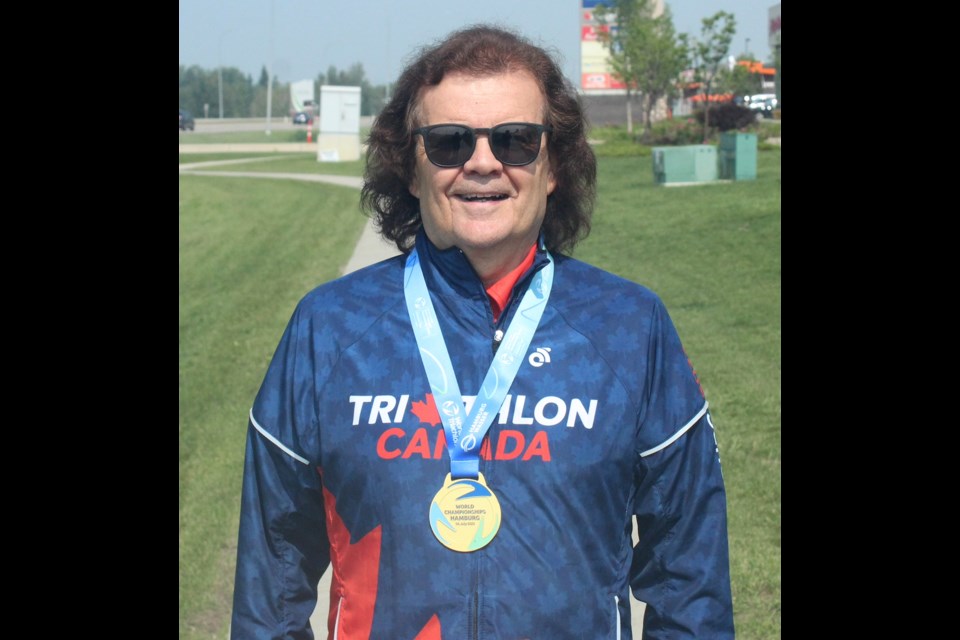Few athletes can say they've competed on a world stage — and even fewer can say they did it in just their second time competing in their sport.
Local senior sprint triathlete Rick Harris can now say he has accomplished both.
Harris, 70, recently returned home after competing in the 2023 World Triathlon Sprint and Relay Championships held in Hamburg, Germany.
His showing on the other side of the Atlantic as part of the 200-plus member Team Canada was just Harris's second sprint triathlon, which consists of a 750-metre swim, a 20-kilometre bike ride, and a five-kilometre run.
The ex-prolific half-marathoner only decided to take up a new sport when he found running as his main form of physical activity was causing his knees to ache, and figured building up some different muscles would (and did) make a difference.
Harris's first event was just last summer at the local St. Albert Triathlon. At the time, Harris told the Gazette his goals were simply to finish the race, and if so, finish in less than two hours.
Well, when Harris not only finished last summer's race but finished nine minutes under the two-hour mark, he qualified for a national team made up of dedicated triathletes aged 16-85 from across the country, and took off for the World Championships in Germany, which took place earlier this month.
In Hamburg, competing in the men's 70-74 age group, Harris finished just four seconds slower than his St. Albert Triathlon result, but as he explained in an interview, a final time only tells part of the story.
“In Europe, they were using a little different timing chip,” he said, referring to a small piece of technology strapped around a competitor's ankle to track the timing of each leg of a race. “It was a very thin piece of Velcro.”
“When (race organizers) put it around my ankle, they put a little bit of tape,” Harris said. “I couldn't figure out why they were putting the tape.”
“In front of me was a woman from the United States, and she said to wrap the tape full, twice — I didn't understand that.”
Still questioning the use of tape, Harris stepped up to the starting mark at the edge of Alster Lake, which is situated in the middle of Hamburg and was used for the swimming portion of the race.
He jumped in, swam the first 300-odd metres, and then felt his timing chip slip off his ankle.
“It's critical,” he said. “Now I'm going, ‘What the heck do I do? Do I look for it?’”
“I hesitated, and then I realized it's gone to the bottom of Davy Jones' Locker, I'm not finding this thing.”
With an even higher sense of urgency to finish the swim, Harris powered through the remaining metres to find a race organizer and deal with the lost chip.
In triathlons, the time spent "transitioning" between the swimming and biking portion still counts towards a competitor's total race time.
With that in mind, Harris said he had to speak with two organizers, and waited for an answer from a third, before being told a replacement chip would be brought to him after the biking portion.
“Everybody's going by me, I'm going 'Oh my God, oh my God.' I'm antsy, I've got to get to my bike, and finally the guy comes back and says to me, 'We're going to put a timing chip in your run bag and you're going to have to cycle without a chip,'” he said.
“Anyway, that all being said, I wouldn't (say I'm) upset, I just have to look at it (as) a learning experience.”
Finishing quicker, living longer
While a technical malfunction like losing a timing chip might sour an experience for many dedicated athletes, Harris's philosophy, and entire reason for doing triathlons isn't to blow his competition out of the water, but rather to improve his health, and when he can, improve his race times.
“The positive thing for me is knowing all of these little tips and tricks,” he said. Through conversations with teammates he has picked up a bunch of new knowledge he plans to implement the next time he races.
For example, Harris said, at the starting point in the Germany he looked down the line at his fellow competitors getting ready to swim and noticed nearly every other racer was wearing a wet suit, while he was wearing his Team Canada-issued tri-suit.
“I thought people were wearing wet suits because they didn't like the cold water (but) it had nothing to do with that; it had to do with buoyancy and swimming faster.”
Another example Harris said he learned from teammates was the extent to which a bicycle can be customized.
For his race in Germany, Harris had rented a bike and picked it up just two days before he competed, which wasn't enough time to get comfortable with a gear shift system he wasn't familiar with.
“Probably the biggest gain I'm going to get over the next three or four years is ... getting the right bike, getting the right pedals, all of that.”
“I'm getting older and I'm getting faster,” he said.
With time to spare before heading back home, Harris said he spent plenty of time watching other age groups race, and in doing so he found another senior athlete to look up to: 89-year-old Jim Farr of Olean, New York.
“I want to be this guy when I grow up,” Harris said of Farr, who finished with a time of two hours and 22 minutes, and was also a member of the gold medal-winning 80 and older mixed relay team.
“This guy is my inspiration.”
Harris will be looking to put his new knowledge to the test next month when he competes in the St. Albert Triathlon, and as he continues towards his goal of living to 111 years old.




